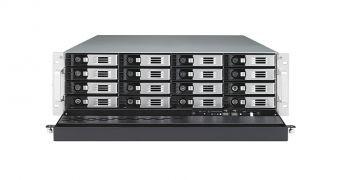Network-attached storage devices have only as much storage space as the hard disk drives inside them can provide, but most of them don't support the biggest ones out there. Thecus is actively trying to catch up, though.
As proof of that, the company has added support for 5 TB hard disk drive units from Seagate to its entire NAS lineup.
Previously, network-attached storage devices couldn't handle hard disk drive units of more than 4 TB, which limited what NAS units could provide.
Sure, those with four bays or more could come close to 16-20 TB per unit, but it was still a limitation. There are 5 TB and even 6 TB units out there after all.
Sometimes, though, you can't really jump too much forward, for various reasons, so Thecus is only now adding 5 TB Seagate HDD support.
It's the first time we hear of this happening though, so the company has an advantage. Especially since it claims to have enabled this on all Thecus NAS devices.
This implies a firmware update of some sort. Thecus worked with Seagate directly in order to ensure full compatibility.
In case you were wondering, the best and largest NAS that Thecus has for sale is one with 16 bays. Sixteen bays.
That means that the total storage space is now of 80 TB, where before it was of 64 TB. That's a significant leap. Not the petabyte-level storage that the company is dreaming about, but a step in that direction nonetheless.
Furthermore, thanks to daisy chaining technology, you can connect up to five of these NAS units together, leading to a total capacity of 400 TB.
Sure, not all of them will be available to you if you implement RAID modes, since the technology turns multiple drives into a single volume and sacrifices some of the capacity in order to use as a sort of cache. RAID enhances security depending on type (0,1,5, 6) but, just as importantly, enables far higher read and write performance.
So, if you, say, take five Thecus N16000PRO 16-bay drives, fill them with 5 TB Seagate HDDs and daisy-chain them, you'll probably have about 390 TB to work with, or thereabouts. And if you use eight daisy chained arrays and link them to one another via volume expansion technology, you get 3.125 petabytes (PB) of storage, more than the human brain is supposedly able to store.
Factor in PowerChoice tech, ramp load technologies and dual processors, and performance should be 35% better, on average, compared to previous-generation Thecus NAS devices. Now we're left wondering how long it will take for 6 TB devices to be supported.

 14 DAY TRIAL //
14 DAY TRIAL //